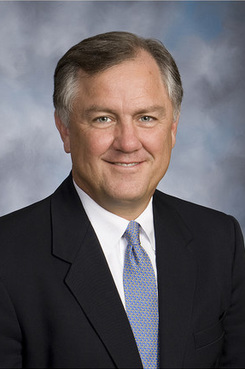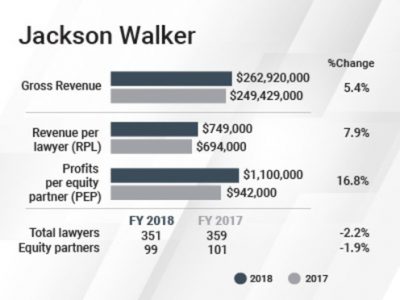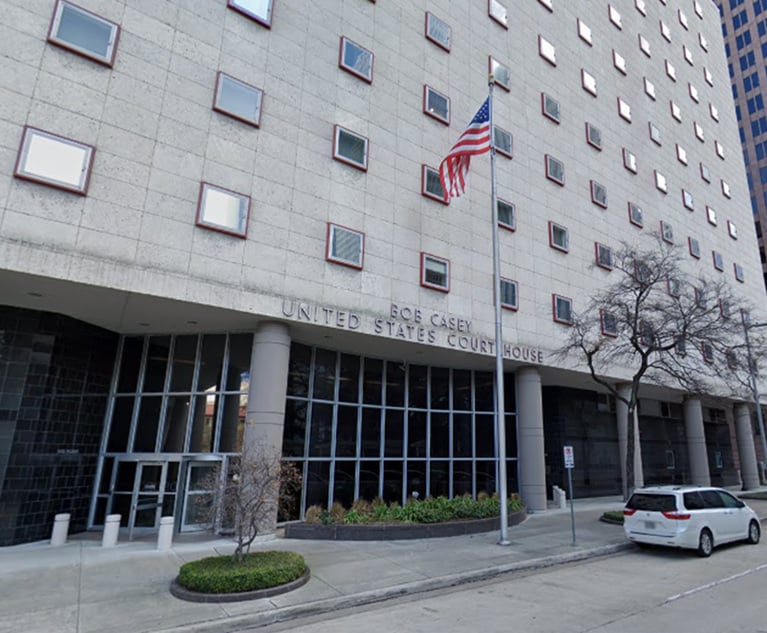Real Estate Work Propels Jackson Walker Past $1M PEP Mark
Revenue at the Texas firm improved by 5.4 percent, while profits per equity partner jumped by 16.8 percent in 2018.
March 14, 2019 at 12:16 PM
4 minute read
 C. Wade Cooper, managing partner of Texas firm Jackson Walker. Courtesy photo.
C. Wade Cooper, managing partner of Texas firm Jackson Walker. Courtesy photo.
Boosted by a robust real estate practice, Texas firm Jackson Walker posted record results for 2018, as gross revenue improved by 5.4 percent and profits per equity partner (PEP) increased by 16.8 percent.
Gross revenue hit $262.9 million at Jackson Walker in 2018, up from $249.4 million in 2017, and revenue per lawyer (RPL) came in at $749,000, up 7.9 percent when compared with $694,000 the prior year.
Net income was $108.7 million in 2018, up 14.9 percent when compared with $94.7 million in 2017. PEP reached $1.1 million, up from $942,000 the year before.
“It was strong across the board, but particularly in real estate. We continue to see a very robust real estate practice, which grew dramatically with the addition of four partners from Gardere,” managing partner C. Wade Cooper said.
That group of four joined Jackson Walker's Dallas office in April before Gardere Wynne Sewell's merger with Foley & Lardner. Earlier in 2018, Jackson Walker also hired lateral real estate partner Pamela Madere in Austin, he said.
 Cooper said real estate has become a huge practice for the firm, with close to 90 lawyers doing real estate work. He said not only did the firm tack on real estate heft in 2018, but the practice was busier, as per-lawyer hours increased in 2018 compared with 2017.
Cooper said real estate has become a huge practice for the firm, with close to 90 lawyers doing real estate work. He said not only did the firm tack on real estate heft in 2018, but the practice was busier, as per-lawyer hours increased in 2018 compared with 2017.
Usually about half of the firm's practice groups improve each year while the other half don't, Cooper said. But in 2018, nine of the firm's 14 practice groups were up on a year-over-year basis, he said.
Litigation was also busier in 2018, Cooper said. In 2017, the practice was in a rebuilding phase because many lawsuits resolved in 2016 or early 2017, but that turned around last year.
Corporate work was “slightly busier” on a year-over-year basis, he said.
Cooper said the firm's 2017 revenue included about $5 million in contingency fees, so noncontingency fee revenue in 2018 actually improved by 7.1 percent.
The firm's head count changed little in 2018, coming in at 351 lawyers on an full-time equivalent basis, down 2.2 percent from 359 in 2017. The firm had 99 equity partners in 2018, down two from 101 the year before.
Jackson Walker had “really good” success in lateral hiring, bringing in 14 partners throughout the year, Cooper said, in areas including real estate, litigation, appeals and bankruptcy. Still, expenses were flat from 2017 to 2018, he said.
“Part of our success is our low-expense platform. That's always been sort of our calling card,” he said.
Cooper said he expects revenue to increase in 2019, as the benefit of 2018's lateral hiring is fully realized. However, the firm will pay a full year of higher associate salaries in 2019—those salaries went into effect midyear in 2018. The firm also benefited from some savings on its real estate expenses in 2018 that will not extend to this year.
Cooper said Jackson Walker increased the number of new clients in 2018 by an unusually high 20 percent, which he views as an indication of the robust Texas market and the firm's success in lateral hiring.
The firm is not looking to add offices in 2019, but is looking to add lawyers in existing offices with a “good book of business and a good cultural fit.” Jackson Walker has seven offices in Texas, and it's the largest Texas-only firm.
Cooper is optimistic about 2019, because the Texas economy is good and the firm has strong practices. On Jan. 1, he said, the partners took one day to celebrate the successful year, and then started working on the next.
Read More
Jackson Walker Grabs 4 Gardere Real Estate Partners
Jackson Walker Adds Trial Lawyer in Houston
Jackson Walker Sees 10 Percent Drop in 2017 Net Income; Slight Increase in Gross Revenue
This content has been archived. It is available through our partners, LexisNexis® and Bloomberg Law.
To view this content, please continue to their sites.
Not a Lexis Subscriber?
Subscribe Now
Not a Bloomberg Law Subscriber?
Subscribe Now
NOT FOR REPRINT
© 2025 ALM Global, LLC, All Rights Reserved. Request academic re-use from www.copyright.com. All other uses, submit a request to [email protected]. For more information visit Asset & Logo Licensing.
You Might Like
View All
JCPenney Seeks Return of More Than $1.1M From Jackson Walker For Bankruptcy Work
3 minute read
Ex-Appellate Court Judges Launch Boutique Focused on Plaintiffs Appeals
2 minute read
O'Melveny, White & Case, Skadden Beef Up in Texas With Energy, Real Estate Lateral Partner Hires
5 minute read
Chamberlain Hrdlicka Taps a New Leader as Firm Follows Succession Planning Path
3 minute readTrending Stories
- 1Consumer Protection Suit Cleared to Go Forward Against Irritating Eye Serum
- 2COVID-19 Was Still Relevant in Securities Class Actions During 2024, Report Says
- 3After Botched Landing of United Airlines Boeing 767, Unlikely Plaintiff Sues Carrier
- 4DOT Moves to Roll Back Emissions Rules, Eliminate DEI Programs
- 5No Injury: Despite Proven Claims, Antitrust Suit Fails
Who Got The Work
J. Brugh Lower of Gibbons has entered an appearance for industrial equipment supplier Devco Corporation in a pending trademark infringement lawsuit. The suit, accusing the defendant of selling knock-off Graco products, was filed Dec. 18 in New Jersey District Court by Rivkin Radler on behalf of Graco Inc. and Graco Minnesota. The case, assigned to U.S. District Judge Zahid N. Quraishi, is 3:24-cv-11294, Graco Inc. et al v. Devco Corporation.
Who Got The Work
Rebecca Maller-Stein and Kent A. Yalowitz of Arnold & Porter Kaye Scholer have entered their appearances for Hanaco Venture Capital and its executives, Lior Prosor and David Frankel, in a pending securities lawsuit. The action, filed on Dec. 24 in New York Southern District Court by Zell, Aron & Co. on behalf of Goldeneye Advisors, accuses the defendants of negligently and fraudulently managing the plaintiff's $1 million investment. The case, assigned to U.S. District Judge Vernon S. Broderick, is 1:24-cv-09918, Goldeneye Advisors, LLC v. Hanaco Venture Capital, Ltd. et al.
Who Got The Work
Attorneys from A&O Shearman has stepped in as defense counsel for Toronto-Dominion Bank and other defendants in a pending securities class action. The suit, filed Dec. 11 in New York Southern District Court by Bleichmar Fonti & Auld, accuses the defendants of concealing the bank's 'pervasive' deficiencies in regards to its compliance with the Bank Secrecy Act and the quality of its anti-money laundering controls. The case, assigned to U.S. District Judge Arun Subramanian, is 1:24-cv-09445, Gonzalez v. The Toronto-Dominion Bank et al.
Who Got The Work
Crown Castle International, a Pennsylvania company providing shared communications infrastructure, has turned to Luke D. Wolf of Gordon Rees Scully Mansukhani to fend off a pending breach-of-contract lawsuit. The court action, filed Nov. 25 in Michigan Eastern District Court by Hooper Hathaway PC on behalf of The Town Residences LLC, accuses Crown Castle of failing to transfer approximately $30,000 in utility payments from T-Mobile in breach of a roof-top lease and assignment agreement. The case, assigned to U.S. District Judge Susan K. Declercq, is 2:24-cv-13131, The Town Residences LLC v. T-Mobile US, Inc. et al.
Who Got The Work
Wilfred P. Coronato and Daniel M. Schwartz of McCarter & English have stepped in as defense counsel to Electrolux Home Products Inc. in a pending product liability lawsuit. The court action, filed Nov. 26 in New York Eastern District Court by Poulos Lopiccolo PC and Nagel Rice LLP on behalf of David Stern, alleges that the defendant's refrigerators’ drawers and shelving repeatedly break and fall apart within months after purchase. The case, assigned to U.S. District Judge Joan M. Azrack, is 2:24-cv-08204, Stern v. Electrolux Home Products, Inc.
Featured Firms
Law Offices of Gary Martin Hays & Associates, P.C.
(470) 294-1674
Law Offices of Mark E. Salomone
(857) 444-6468
Smith & Hassler
(713) 739-1250






